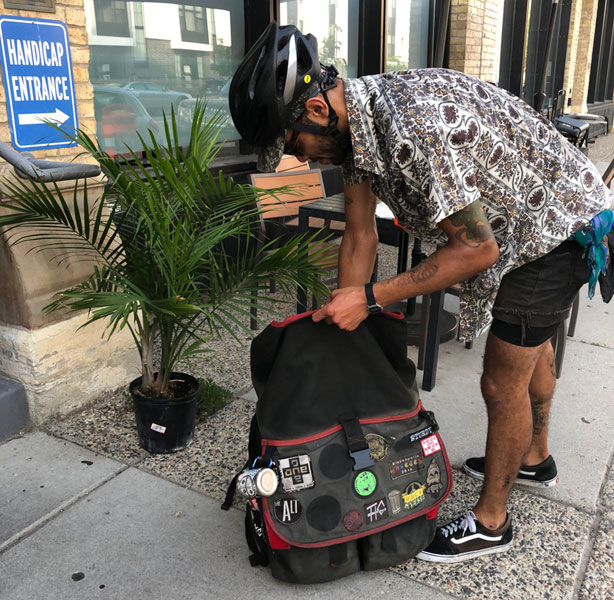Step aside robots and drones, homebound diners in Minneapolis are getting their food delivered via Rock-It. Or to be exact, a Rock-It Bicycle Delivery rider.
A decade ago, Rock-It’s Owner/Rider Nick Gibbons was making his living as a legal courier when he saw the work drying up thanks to technology. A friend who was a manager for the now-closed Bewitched deli in Minneapolis mentioned she was having trouble finding someone to make last-minute catering deliveries to downtown locations.
“I knew all the downtown bike couriers,” he says, and as a favor, he organized them to solve his friend’s problem. That act of kindness gave him the idea that if he could deliver for one restaurant, he could do it for multiple restaurants. It was a side-gig that became his main gig. He started his company about the same time Bite Squad, also headquartered in Minneapolis, launched its third-party delivery, he says.
Urban areas are creating a niche business for serious bicyclists. And while machine usually trumps man, bicyclists can go places no car can go. “We’re halfway to our next assignment by the time you’d find a parking spot,” Gibbons says about car deliveries.
There wasn’t a model at the time to replicate, Gibbons says, so he did the trial-and-error version of building his company. Delivering food was “a completely different bird,” from legal documents, he says. At the time he was working for a company with a fleet of 30 cars and six bikes, and a framework of bureaucracy. Going out on his own meant he had to learn to run a business from the seat of a bike. He did get a break, however, when some friends were doing something similar in San Francisco and asked him to help test out their bike delivery software.
While technology took away his courier business, it enabled him to start Rock-It. “I couldn’t have done it 10 years before,” he says, before the proliferation of inexpensive software, smartphones and apps. All correspondence with the restaurants and bikers is handled through an app. Couriers mount their smartphones to their backpack strap to keep track of new orders popping up so they can reroute themselves on the fly to pick up new orders.
“I can give any one of them (his riders) an address (in Minneapolis) and they can tell you four ways to get there,” he says. GPS is not needed, in fact, not using GPS is what helps riders ultimately learn the lay of the land. “The longest Point A to Point B is three-and-a-half miles,” he says, about their delivery area.
He currently employs both full-time and part-time couriers. “We don’t have our own marketplace,” he says. Orders come through the restaurants’ website which then come to them. Riders see the orders log in and accept the ones they want. Which he admits can lead to some problems, and most likely is one of the reasons his title also includes “rider.”
The payoff is a small delivery fee, a tip for the rider, and an additional percentage from the restaurants on sales, he says.
The one problem they don’t have is transporting the orders, thanks to couriers using backpacks specifically designed for food delivery. Their vendor of choice is Minneapolis-based Trash Messenger Bags.
Andy Larson, who owns Trash Bags (and owned by it, he jokes), was a bike courier with no sewing skills before starting his company. Gibbons, who buys all his bags from Larson, likes to hang out at their workspace in the trendy North Loop neighborhood when he’s waiting for deliveries. He’s there for the camaraderie, not overseeing production, however: A testament to the bike courier subculture.
None of the bags he purchases are logo’d, Gibbons says, because they’re not running a corporate business. Plus bike couriers tend to buy their own backpacks.
Both Larson and Gibbons are examples of non-traditional bosses whose laid-back style still produces an in-demand product. Next to Larson’s sewing machine—he taught himself to sew in the 10 years he’s been running the business—is an oversized poster where he and his three workers keep track of repetitive things they see or hear outside their oversized windows, such as the number of times the landlord plays the same (expletive) song in a day (13) or the number of “awesome doggos” (5, corgis 6) or things majestically lifted by crane (four). “We try not to take ourselves too seriously,” Larson says, adding that they do for the record take their craftsmanship seriously. “Sewing is easy,” he contends, “sewing well is hard.”
The backpacks he produces for food delivery have to be water- and wind-proof and easy to load and unload. There’s an insert at the bottom that provides stability and shelves and compartment arrangements to keep food from sliding around or being squashed as it’s stacked.
“When you open them in the winter there’s a big plume of smoke,” Gibbons says to prove how hot the bags keep hot food.
One would think that delivering food in Minnesota in the winter would drive one to use a car, but we’re dealing with a culture here that like a challenge. Rock-It bike courier Paul Nero moved from California to Minnesota just so he could run his bike in the snow. “People shouldn’t be allowed to have that much fun,” he said, adding that he’s only fallen off his bike three times and never once has his food order been harmed.
Ride on.


